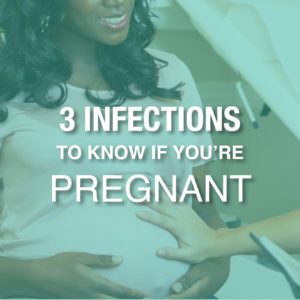Prenatal Infection Prevention Month: 3 Infections to Know About if You’re Pregnant
Posted in:Expecting a BabyHelp Me GrowHome Visiting
Share:
 Creating a healthy life for your baby starts before his or her birth. Preventing infections during pregnancy is a major step mothers need to take. Infections can cause future health problems for your baby like
Creating a healthy life for your baby starts before his or her birth. Preventing infections during pregnancy is a major step mothers need to take. Infections can cause future health problems for your baby like
Group B Strep – is a bacterium that is often carried by women in their birth canal and passed to their baby during birth. The bacteria aren’t usually harmful to pregnant women, but can severely hurt babies.
- Prevention: none, because the cause of the infection in adults is unknown
- Symptoms: the bacteria is rarely harmful to adults, sometimes women may get a UTI
- Testing: have your doctor or care provider test you for Strep B when you are 35-37 weeks pregnant
- Treatment: your doctor can prescribe an antibiotic to protect your baby
Cytomegalovirus (CMV) – is a virus that is passed to infants by their mothers. Pregnant women may become exposed to CMV through contact with the body fluids of a child who has CMV. CMV infection is most dangerous to the unborn baby if it occurs in the early part of the pregnancy.
- Prevention: frequently wash hands, counters, and toys to avoid contact with children’s saliva or urine
- Symptoms: there are typically no signs of adult CMV, sometimes it has characteristics of mono
- Testing: doctors can do a test for CMV upon request
- Treatment: there is no treatment to cure CMV
Listeriosis – effects people with weak immune systems, like pregnant women, when they eat food that is contaminated by the bacteria called Listeria.
- Prevention: avoid eating uncooked, processed meat, raw milk, soft cheeses, and
more - Symptoms: fever, fatigue, muscle aches, or headaches
- Testing: there is no routine testing done to detect Listeriosis
- Treatment: a doctor may prescribe antibiotics if a person is experiencing symptoms
Follow doctor’s guidelines for before, during, and after pregnancy. It is always important to schedule regular visits with your doctor, especially if you are pregnant or planning for pregnancy. Dial 2-1-1 for the Help Me Grow hotline if you need assistance or 9-1-1 if you are experiencing an emergency. A trained professional will provide answers to your questions about pregnancy and connect you to trusted resources in Delaware.